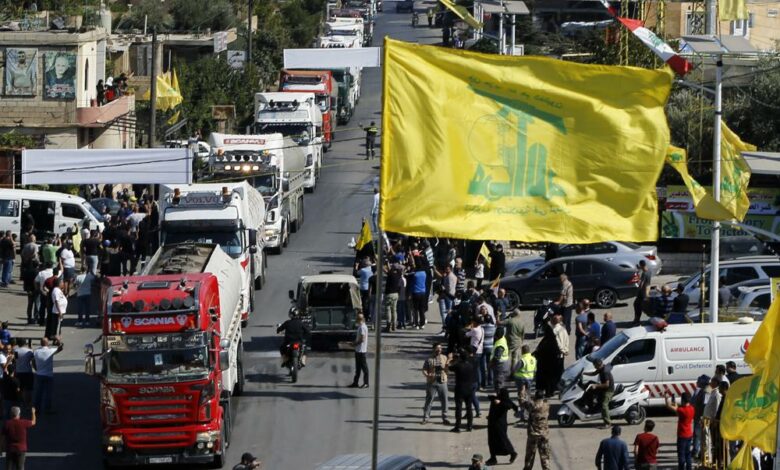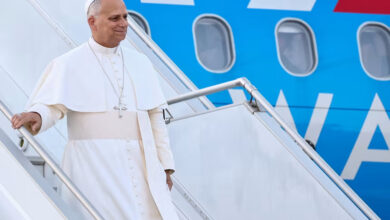
AL-AIN, Lebanon (AP) — A convoy of tanker trucks carrying Iranian diesel crossed the border from Syria into Lebanon early Thursday, the first in a series of deliveries organized by the militant Hezbollah group to ease crippling fuel shortages in the crisis-hit Mediterranean country.
The delivery violates US sanctions imposed on Tehran after former President Donald Trump pulled America out of a nuclear deal between Iran and world powers in 2018.
It was portrayed as a victory by Hezbollah, which stepped in to supply the fuel from its patron, Iran, while the cash-strapped Lebanese government grapples with months-long fuel shortages.
“This is a very big and great thing for us because we broke the siege of America and foreign countries. … We are working with the help of God and our great mother Iran,” said Nabiha Idriss, a Hezbollah supporter gathered with others to greet the convoy as it passed through the eastern town of Al-Ain.
There was no immediate comment from Lebanese or US officials on the Iranian fuel delivery.
Hezbollah has portrayed the Lebanese economic meltdown, which began in late 2019, as partly caused by an informal siege imposed by America due to the militant group’s power and influence in Lebanon. The group — designated a terrorist organization by Washington — has been sanctioned by consecutive US administrations.
Lebanon’s crisis is rooted in decades of corruption and mismanagement by the ruling class and a sectarian-based political system that thrives on patronage and nepotism. Severe shortages in fuel have paralyzed the country, resulting in crippling power cuts. People wait hours in line for gasoline.
Hezbollah’s leader, Sayyed Hassan Nasrallah, announced last month that Iran was sending fuel to Lebanon to help ease the crisis. The first Hezbollah-commissioned Iranian oil tanker arrived in the Syrian port of Baniyas on Sunday and the diesel was unloaded to Syrian storage places before it was brought overland to Lebanon on Thursday by tanker trucks.
The convoy of 60 trucks, each carrying 50,000 liters (13,210 gallons), went through an informal border crossing in Qusayr in Syria. Another convoy of 60 tanker trucks is expected Friday.
Hezbollah, often accused of operating a state-within-a-state, has been taking part in Syria’s civil war alongside government forces. It manages its own crossing points along the Lebanon-Syria border, away from formal border crossings.
Nasrallah said in a televised speech earlier this week that the tanker did not offload its cargo directly in Lebanon to avoid embarrassing authorities and risking sanctions on Lebanon.
Hezbollah’s Al-Manar TV called it “the tanker truck convoys to break the American siege.” It said the trucks were on their way to the eastern Lebanese city of Baalbek where a Hezbollah-linked distribution company will start distributing the fuel. Nasrallah said the company, al-Amana, which is already under US sanctions, won’t risk new penalties.
For critics, however, the convoy is a symbol of the dissolution of the Lebanese state.
“Don’t forget this day,” tweeted Laury Haytayan, a Lebanese oil and gas expert and activist, describing it as the day Hezbollah won over the Lebanese state.
Lebanese gathered on the roadside leading to Lebanon’s Bekaa Valley to greet the convoy. Hezbollah’s yellow flags and banners praising the Iran-backed group and Syria’s President Bashar Assad decorated the streets. A few women showered the trucks with rice and flowers as they drove past. Others raised banners reading: “Thank you Iran,” and “Thank you Syria.” Heavy gunfire, and at least one rocket propelled-grenade, were fired in celebration.
Lebanon’s new Prime Minister Najib Mikati, whose government was formed last week after a 13-month political deadlock, has not commented on Hezbollah’s deal to import fuel from Iran.
Nasrallah has said a month’s worth of diesel would be donated to public hospitals, nursing homes, orphanages, water stations and the Lebanese Red Cross. He said fuel would also be sold at discount prices to private hospitals, pharmaceutical factories, bakeries and cooperatives that sell food products.
He said three other tankers carrying diesel and one carrying gasoline are to arrive in the coming weeks.



